
International Journal of Surface Science and Engineering
Scope & Guideline
Elevating Surface Science to New Heights
Introduction
Aims and Scopes
- Surface Modification Techniques:
The journal covers various methodologies for modifying surfaces to enhance their properties, including coatings, texturing, and chemical treatments. These techniques aim to improve wear resistance, corrosion resistance, and overall performance in practical applications. - Tribological Studies:
A core focus of the journal is the investigation of tribological behavior of materials under various conditions. This encompasses studies on friction, wear, and lubrication mechanisms, providing valuable insights for applications in mechanical engineering and materials science. - Material Characterization:
The journal emphasizes the importance of characterizing materials at the surface level to understand their behavior and performance. This includes studies on microstructural analysis, mechanical properties, and corrosion resistance. - Application-Oriented Research:
Research published in the journal often highlights practical applications of surface science in industries such as aerospace, biomedical, automotive, and manufacturing, demonstrating the real-world relevance of surface engineering. - Interdisciplinary Approaches:
The journal promotes interdisciplinary research that integrates principles from physics, chemistry, and engineering, reflecting the complex nature of surface phenomena and their impact on material performance.
Trending and Emerging
- Sustainable and Eco-Friendly Materials:
There is a growing trend towards researching bio-based lubricants and eco-friendly surface treatments, responding to the increasing demand for sustainable practices in material engineering. - Nanotechnology in Surface Engineering:
The application of nanotechnology is becoming a prominent theme, particularly in the development of nanocomposites and nanocoatings. These innovations offer enhanced properties such as improved wear resistance and antibacterial effects. - Advanced Tribological Solutions:
Recent publications show a rising interest in advanced tribological solutions, including the use of hybrid lubricants and smart materials that adapt to changing operational conditions, enhancing performance and longevity. - Biomedical Applications of Surface Science:
Research focusing on the application of surface engineering in biomedical fields, such as implant materials and coatings for medical devices, is gaining momentum, driven by the need for improved biocompatibility and functionality. - Integration of Simulation and Experimental Techniques:
There is an emerging focus on integrating computational modeling with experimental studies to better predict material behavior and optimize surface treatments, showcasing a trend towards a more data-driven approach in surface science.
Declining or Waning
- Traditional Coating Methods:
Research on conventional coating techniques appears to be decreasing, as newer methods such as advanced plasma spraying and magnetron sputtering gain attention. This shift reflects a move towards more innovative solutions that offer enhanced performance. - Basic Friction Studies:
Basic studies on friction without considering complex variables or real-world applications have become less frequent. Current trends favor more comprehensive investigations that incorporate environmental factors, material interactions, and application-specific conditions. - Low-Tech Surface Treatments:
There is a noticeable decline in studies focused on low-tech surface treatment methods, such as simple polishing or basic chemical treatments. The emphasis has shifted towards high-tech and advanced methods that provide superior results. - Single-Material Studies:
Research focusing exclusively on single materials without comparative analysis is becoming less common. The trend indicates a preference for studies that explore hybrid materials or composites, reflecting the need for multifunctional materials.
Similar Journals
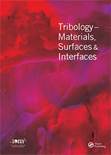
Tribology-Materials Surfaces & Interfaces
Innovating solutions through the science of interactions.Tribology-Materials Surfaces & Interfaces is a leading journal dedicated to advancing the field of tribology, leveraging insights into materials, surfaces, and interface interactions. Published by SAGE Publications Inc in the United Kingdom, this journal plays a pivotal role in disseminating high-quality research, providing a platform for both foundational and applied studies in mechanical engineering and materials science. With an impact factor reflecting its significance, ranking in the third quartile for both Materials Science and Mechanical Engineering, it caters to a diverse audience including researchers, industry professionals, and students. Although it currently does not offer open access, the journal endeavors to periodically review and publish innovative studies that enhance understanding of tribological phenomena, thereby contributing to the development of advanced materials and engineering solutions. Since its inception in 2007, Tribology-Materials Surfaces & Interfaces has consistently presented cutting-edge findings, thereby cementing its position as an essential resource for anyone engaging in tribological research.

Surface Topography-Metrology and Properties
Connecting metrology with material performance for a brighter future.Surface Topography-Metrology and Properties is an esteemed journal published by IOP Publishing Ltd, dedicated to advancing the field of surface metrology and its interrelation with material properties. With an ISSN of 2051-672X, this journal serves as a pivotal platform for researchers, professionals, and students engaged in the study of surfaces and coatings, particularly in disciplines such as Instrumentation, Materials Chemistry, and Process Chemistry and Technology. The journal maintains a strong academic presence with notable Category Quartile rankings, including Q2 in Materials Chemistry and Surfaces, Coatings and Films, and Q3 in other relevant fields. Although the journal operates under a subscription model, it offers valuable insights and findings that are crucial for advancing technologies reliant on surface characteristics and functionalities. Since its inception in 2013, the journal has continued to publish high-quality research up to the present day, catering to the ongoing needs of the scientific community and contributing significantly to the discourse in surface science.
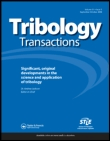
TRIBOLOGY TRANSACTIONS
Unlocking the Secrets of Material InteractionsTRIBOLOGY TRANSACTIONS is a leading journal published by Taylor & Francis Inc, serving as a crucial platform for researchers and practitioners in the fields of mechanical engineering, mechanics of materials, and surface science. With an ISSN of 1040-2004 and an E-ISSN of 1547-397X, this journal features pioneering research and comprehensive studies that span from 1988 to 2024, reflecting its longstanding commitment to advancing knowledge in tribology and its related disciplines. The journal holds a respectable Q2 ranking in its categories, with impressive scores in major databases, as indicated by its Scopus ranking. Although not an Open Access journal, its strategic focus on innovative tribological solutions makes it essential reading for anyone involved in material interactions, surface engineering, and related technologies. Researchers, professionals, and students alike will find valuable insights that drive advancements in these critical areas of study, reinforcing the journal’s position as a key resource in the academic and applied engineering communities.

CORROSION SCIENCE
Leading the charge in corrosion research and technology.CORROSION SCIENCE, published by Pergamon-Elsevier Science Ltd, is a leading journal in the field of corrosion research, recognized for its significant contribution to advancing knowledge in Chemical Engineering, Chemistry, and Materials Science.
With a remarkable impact factor placing it in the Q1 category as of 2023, this journal serves as a crucial platform for researchers, engineers, and practitioners dedicated to the study of corrosion processes, prevention methods, and material degradation. Since its inception in 1961, CORROSION SCIENCE has consistently provided high-quality peer-reviewed articles that explore innovative solutions to corrosion-related challenges, fostering advancements not only in academic research but also in practical applications across various industries. The journal is based in the United Kingdom and is accessible through various academic databases, making it a vital resource for students and professionals seeking to enhance their understanding of corrosion mechanisms and mitigation strategies.

JOM
Shaping the future of engineering and materials applications.JOM, published by Springer, is a leading academic journal dedicated to advancing research in the fields of Engineering and Materials Science. With an ISSN of 1047-4838 and an E-ISSN of 1543-1851, JOM has established itself as a reputable source of scholarly articles, contributing significantly to the understanding and development of materials and their applications in engineering. As of 2023, it ranks in the second quartile (Q2) in both the Engineering (miscellaneous) and Materials Science (miscellaneous) categories, showcasing its influence and academic rigor. With a Scopus rank of #84 in General Engineering and #212 in General Materials Science, JOM is positioned as a vital resource for academics and professionals aiming to stay abreast of the latest research trends and innovations. Although the journal does not currently offer open access options, its commitment to quality publishing continues to make it an essential read for researchers and students alike, fostering a collaborative environment for growth and discovery in the materials science community.
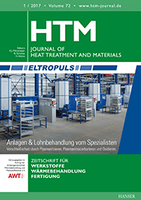
HTM-Journal of Heat Treatment and Materials
Elevating the discourse in heat treatment and materials engineering.HTM-Journal of Heat Treatment and Materials, published by WALTER DE GRUYTER GMBH, serves as a vital platform for the dissemination of research in the fields of Industrial and Manufacturing Engineering, Materials Chemistry, and Metals and Alloys. With an ISSN of 1867-2493 and an E-ISSN of 2194-1831, this peer-reviewed journal focuses on the advancements and methodologies associated with heat treatment processes, materials innovation, and their applications across various industries. Notably recognized in the Q3 category for Industrial and Manufacturing Engineering and Materials Chemistry, as well as Q2 for Metals and Alloys, the journal has garnered significant attention, illustrated by its Scopus rankings, placing it among the scholarly discussions within the field. Although it operates under a closed access model, the journal remains committed to impactful research that influences both academia and industry, ensuring its relevance and importance in shaping future developments in materials science. It is an essential resource for researchers, professionals, and students striving to stay at the forefront of heat treatment and materials research.

Frontiers of Mechanical Engineering
Driving Innovation Through Open Access ResearchFrontiers of Mechanical Engineering is a premier journal dedicated to advancing the field of mechanical engineering, published by HIGHER EDUCATION PRESS. Located in Beijing, China, this esteemed journal has been a vital platform for innovative research since its establishment in 2011 and continues to contribute significantly to the scientific community with its convergence of studies extending through 2024. With an impressive Q1 ranking in mechanical engineering and a strong placement in the Scopus rankings (#108 out of 672, 84th percentile), the journal showcases high-impact articles that drive forward the knowledge frontier in areas such as thermodynamics, fluid mechanics, and material science. Although it operates on an open-access model, Frontiers of Mechanical Engineering is committed to making significant research universally accessible, ensuring that findings from esteemed researchers reach academic and industrial audiences alike. This journal not only plays a crucial role in disseminating cutting-edge mechanical engineering research but also fosters collaboration between academia and industry experts striving towards innovation and excellence in engineering practices.

Russian Journal of Non-Ferrous Metals
Exploring the Mechanics of Metals and AlloysThe Russian Journal of Non-Ferrous Metals, published by PLEIADES PUBLISHING INC, serves as a vital resource for researchers and professionals in the fields of materials science and engineering. With a dual ISSN (1067-8212 for print and 1934-970X for online), this journal has been instrumental in disseminating cutting-edge research from 2007 to 2023. Specializing in the mechanics of materials, metals and alloys, and the study of surfaces, coatings, and films, it provides invaluable insights into the latest advancements and applications in these areas. Although currently categorized in the Q4 tier for mechanics of materials and surfaces, and Q3 for metals and alloys in the 2023 rankings, its commitment to quality research is reflected in its Scopus metrics, ranking it within the competitive spectrum of its fields. While not an open access journal, it remains a crucial academic platform for fostering knowledge exchange among professionals and scholars. By publishing high-quality articles, the Russian Journal of Non-Ferrous Metals contributes significantly to the ongoing dialogue in metallurgical science and engineering.
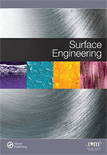
SURFACE ENGINEERING
Driving Excellence in Surface Engineering ScholarshipSURFACE ENGINEERING, published by SAGE Publications Inc, is a premier international journal dedicated to the advancement of knowledge in the fields of material surface science and engineering. With an ISSN of 0267-0844 and E-ISSN 1743-2944, this esteemed journal has been a critical resource since its inception in 1985, and continues to thrive through 2024. Recognized for its impactful contributions, SURFACE ENGINEERING achieves notable rankings in several categories including Q1 in Conservation and Q2 in key areas such as Condensed Matter Physics and Materials Chemistry. The journal serves a diverse audience of researchers, professionals, and students, providing them with insightful research articles, reviews, and technological developments that drive innovation in surface coatings, materials chemistry, and related disciplines. Although the journal follows a traditional subscription model, it remains an essential platform for disseminating crucial findings and fostering collaborations within the scientific community.
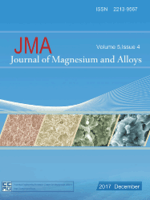
Journal of Magnesium and Alloys
Exploring Innovations in Magnesium and AlloysThe Journal of Magnesium and Alloys is a prestigious, peer-reviewed academic publication dedicated to advancing the field of materials science, particularly focusing on magnesium and its alloys. Published by KEAI PUBLISHING LTD since 2013, this Open Access journal enables unrestricted dissemination of research findings, enhancing global collaboration among researchers, professionals, and students. With an ISSN of 2213-9567 and a significant impact factor, it has established itself in the upper quartiles (Q1) of both the Mechanics of Materials and Metals and Alloys categories, ranking #3 out of 176 and #9 out of 398 respectively according to Scopus. The journal aims to provide a forum for the latest advances in the understanding, production, and application of magnesium alloys, fostering innovation and sustainable practices within the materials engineering community. Based in Beijing, China, the journal is committed to bridging gaps in current knowledge and driving future research directions through its high-quality publications.